Art’s Automotive in Berkeley provides expert catalytic converter replacement, whether your converter has been stolen or has failed due to age or other factors. We proudly serve Berkeley and the surrounding area, and our experienced technicians install only high-quality, genuine catalytic converters to ensure a long-lasting repair you can trust. And yes, we’ll work with your insurance company.
We know it’s tempting to look for cheaper alternatives, but our years of experience have shown that aftermarket parts often lead to repeated problems and higher costs in the long run. Investing in quality now means peace of mind down the road.
On this page, we’ll explain what a catalytic converter is, how to recognize when it’s failing, why proper diagnosis matters, and how to choose the right replacement for your vehicle—so you can make the best decision for your car.
Table of contents
- What Is A Catalytic Converter
- How Can You Tell If Your Catalytic Converter Has Failed
- Why Do Catalytic Converters Fail
- How to Diagnose a Failed Catalytic Converter
- Aftermarket Replacement Catalytic Converters
- Need a Replacement Catalytic Converter in Berkeley?
- Theft & Catalytic Converter Replacement, a Berkeley Epidemic
- Prius catalytic converter theft
- Cat shield – It doesn’t work on the Gen2
- Will insurance cover a replacement catalytic converter?
- The Government’s Ineffectual and Misguided Attempts to Stop Converter Theft
- Other reading
What Is A Catalytic Converter
A catalytic converter is part of your car’s exhaust system designed to reduce emissions, namely carbon monoxide (CO), hydrocarbons (HC), and Oxides of Nitrogen (NOx). These emissions contribute to hazy orange skies and negatively impact human health. Contrary to popular belief, a catalytic converter won’t reduce you car’s performance and its only downside is it’s cost.
As exhaust gases flow through the catalytic converter, it reduces harmful emissions through two simultaneous chemical processes:
- Reduction converts nitrogen oxides (NOx) into nitrogen (N₂) and oxygen (O₂) using rhodium catalysts.
- Oxidation transforms carbon monoxide (CO) into carbon dioxide (CO₂) and unburned hydrocarbons (HC) into water (H₂O) and CO₂, facilitated by platinum and palladium catalysts.
These reactions occur on a ceramic honeycomb structure coated with precious metals, ensuring efficient conversion under controlled air-fuel conditions.
How Can You Tell If Your Catalytic Converter Has Failed
So what are the symptoms of catalytic converter failure? It depends on the type of failure. There are two main types of failure:
- Loss of efficiency in converting HC, CO, and NOx into water, carbon dioxide, and nitrogen (causes a check engine light)
- A clogged converter due to melting or cracking (causes a loss of performance without a check engine light)
So, How Can You Tell Your Converter Is Bad From The Driver’s Seat?
- The check engine light is on and you find a P0420 or P0430 trouble code stored
- The engine won’t start or lacks power at higher RPM under load (often with no check engine light)
- There is a rattling noise under the car (often with no check engine light)
- Reduced fuel economy (often with no check engine light)
Why Do Catalytic Converters Fail
Damage Due to Misfire
If you are ever driving a car with a flashing check engine light, stop driving as soon as you can. When the check engine light is flashing that means there’s a misfire. A misfire is when one or more cylinders is/are not burning the air fuel mixture properly. This leads to unburned fuel entering the exhaust and being processed by the catalytic converter, which causes the converter to overheat and melt.
If you were to hold a bunch of plastic drinking straws together, this would be similar to the ceramic matrix in the catalytic converter. If you held the straws to a flame, they’d melt and it would be difficult to blow air through them.
Ceramic doesn’t melt easily, but if the engine is running poorly and there is an excessive amount of unburned fuel in the exhaust, the combination of the chemical reaction and burning of the fuel on the hot converter can increase the temperature to thousands of degrees and cause the ceramic to melt.

Normal Wear And Tear
In theory, a catalytic converter never wears out because the catalysts are not consumed in the catalytic reaction. Unfortunately, this is just the theory. In practice years of exhaust gas flowing over the catalytic converters element wears it away slowly. The expensive platinum, palladium, and rhodium end up as dust on the highway behind your car.
Coating With Foreign Oils/Fluids
An engine that burns excessive motor oil or has a head gasket leak can ruin a converter quickly. These substances like motor oil and coolant can coat the catalyst’s element, so that passing exhaust gas no longer interacts with the catalyst.
Impact Damage
Ceramic is hard, but it’s also brittle. If the exhaust system takes some abuse in a collision or while you’re off-roading the converter can crack.
How to Diagnose a Failed Catalytic Converter
At Art’s Automotive Berkeley, we won’t replace a catalytic converter based on a trouble code alone. Catalytic converters are expensive, so it makes sense to verify the converter is actually bad, and that there is nothing wrong with the car that’s causing the catalytic converter to go bad. It would be a shame to install a brand new converter, only to need another brand new converter a short while later.
The two most important things to check are:
- Engine performance (misfires, fuel control, timing, etc.)
- Exhaust leaks before the converter
Aftermarket Replacement Catalytic Converters
The cost of a catalytic converter is mostly driven by the precious metals used in it’s construction. Sure, the metal shell costs a bit to manufacture, but it’s nothing compared to the cost of the catalyst elements. So, if a converter from a Honda dealership is $2100 and an aftermarket converter is $1100, where is the savings coming from. If you guessed that the aftermarket converter has much less precious metal in it, you would be right.
In California, aftermarket converters must be approved by the CARB (California air resources board). Manufacturers samples are tested and if they pass the converter is issued an EO (Executive Order) number for use on a specific set of vehicles. Aftermarket manufactures only need to apply a coating thick enough to be functional for testing, not to be long lasting.
California mandates a 5 year warranty on all catalytic converters sold in the state. This applies to all aftermarket converters tool On the other hand, Toyota, Honda, Subaru, and Nissan may need to warranty their converter up to 15 years depending on the emissions classification of the vehicle. The original equipment converters are built to a much higher standard.
Need a Replacement Catalytic Converter in Berkeley?
If you need a replacement catalytic converter in Berkeley-whether it’s due to theft, age, or a check engine light – Art’s Automotive is here to help. Our experienced technicians will accurately diagnose the issue, explain your options, and install only high-quality, CARB-compliant converters that meet California’s strict standards. We’re committed to honest advice, lasting repairs, and getting you back on the road quickly and safely. Schedule a catalytic converter replacement at our Berkeley shop today (510) 540-7093
Theft & Catalytic Converter Replacement, a Berkeley Epidemic
The wild streets of Berkeley have kept us very busy with catalytic converter replacement. Catalytic converter theft comes in waves. This most recent wave (2020-2023, with no signs of slowing down) has been the most severe ever.
There have been other waves, which have come and gone, but we’ve never seen catalytic converter theft on this scale or for this long. It’s out of control. We have some opinions on why people are stealing catalytic converters, which we’ll cover later, but let’s talk first about what’s happening, and how it affects real people.
Prius catalytic converter theft
We replace more Prius catalysts than any other type. The Gen2 Prius made from 2004-2009 was the first car to be hit. The picture to the right is $22,000 worth of Gen2 Prius catalytic converters, enough to last us 1 – 2 weeks.
Our monthly Toyota invoices soared from $15,000 -$20,000 to $80,000. I suppose we can be thankful for the catalytic converte replacement income during the covid shutdown, but replacing catalytic converters is both boring and depressing. We’d much rather be doing something productive.
Why were thieves hitting the 2004-2009 Prius and leaving other cars alone? We don’t really know.
We used to joke that they’d trade information while gathering around the tweaker campfire, swapping stories and insight amidst piles of disassemble bicycles and broken microwaves. However, I suspect the real answer is organized crime, which I’ll talk about a little later.
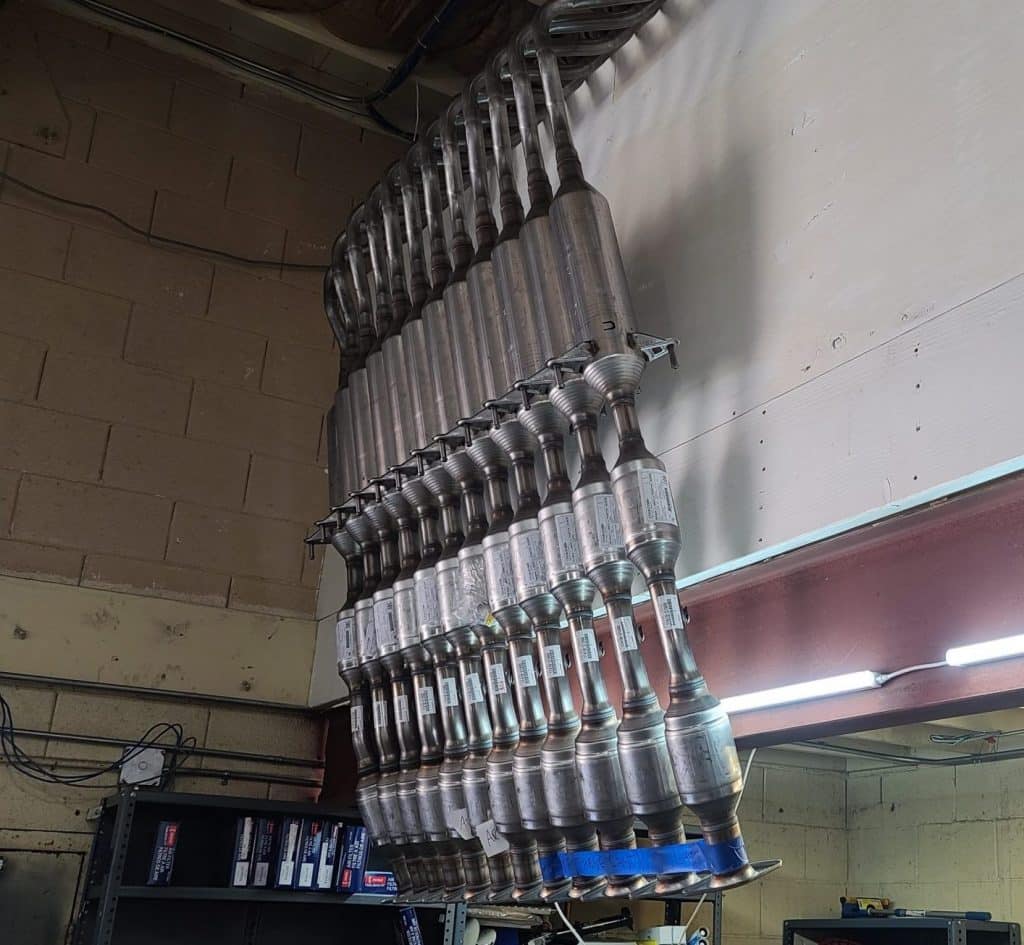
Prius catalytic converter theft prevention
Necessity is the mother of invention, so it’s natural that people started to develop catalytic converter anti-theft devices when converter theft became an issue.
Our lead mechanic Morgan came up with the idea of cables to secure the converter to the exhaust manifold. The first anti-theft device he installed was for a friend whose converter had just been stolen for a second time on his Honda Element.
It was quickly put to the test. On the third attempt the anti-theft worked, and he woke up as the thieves were struggling with it and chased them off with a bat. Don’t do that by the way. More on why later.
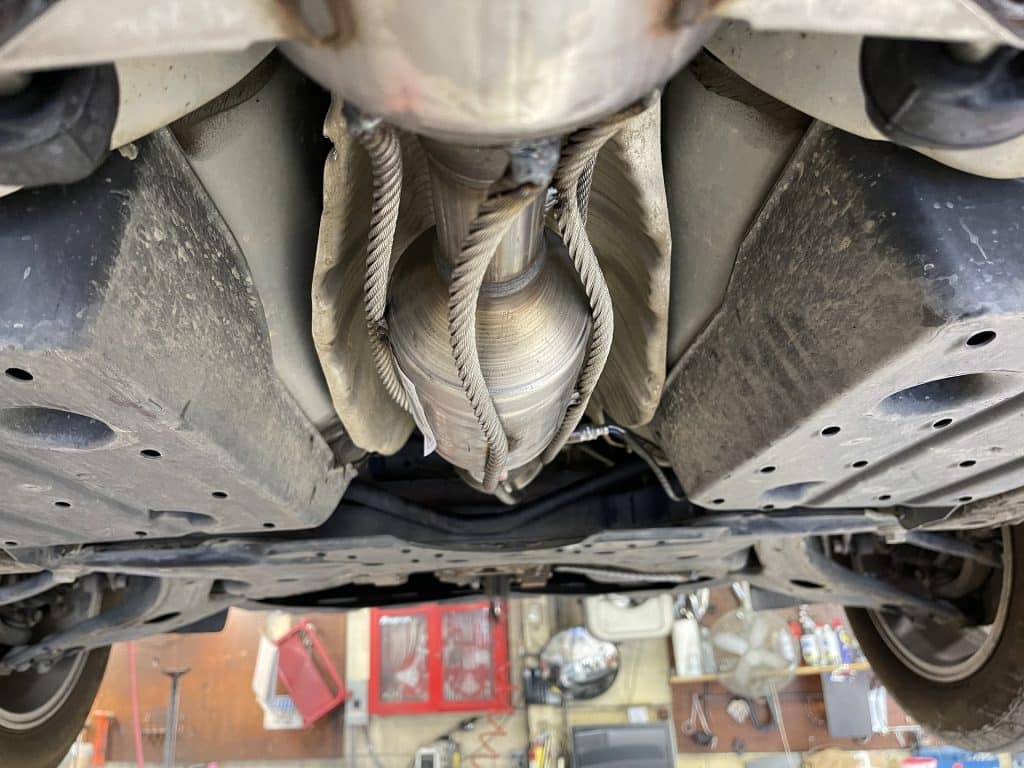
Cat shield – It doesn’t work on the Gen2
Below are a couple examples of a catalytic converter anti-theft cover. On the right is a well manufactured aluminum shield made by a company called Cat Security. It’s riveted to the body of the car and blocks access to the converter from underneath the car.
But here’s the problem with using this device for the 2004-2009 Prius – the converter can be unbolted by reaching in through the wheel well. The Gen2 has no steering lock, and the wheel can be turned to the left which allows a thief to reach in and silently unbolt the catalytic converter.
The picture on the left is a do-it-yourself converter shield that remains completely undisturbed after a catalytic converter theft. I think it’s a dog crate or something similar. It would have been pretty effective if there were no access through the wheel well.
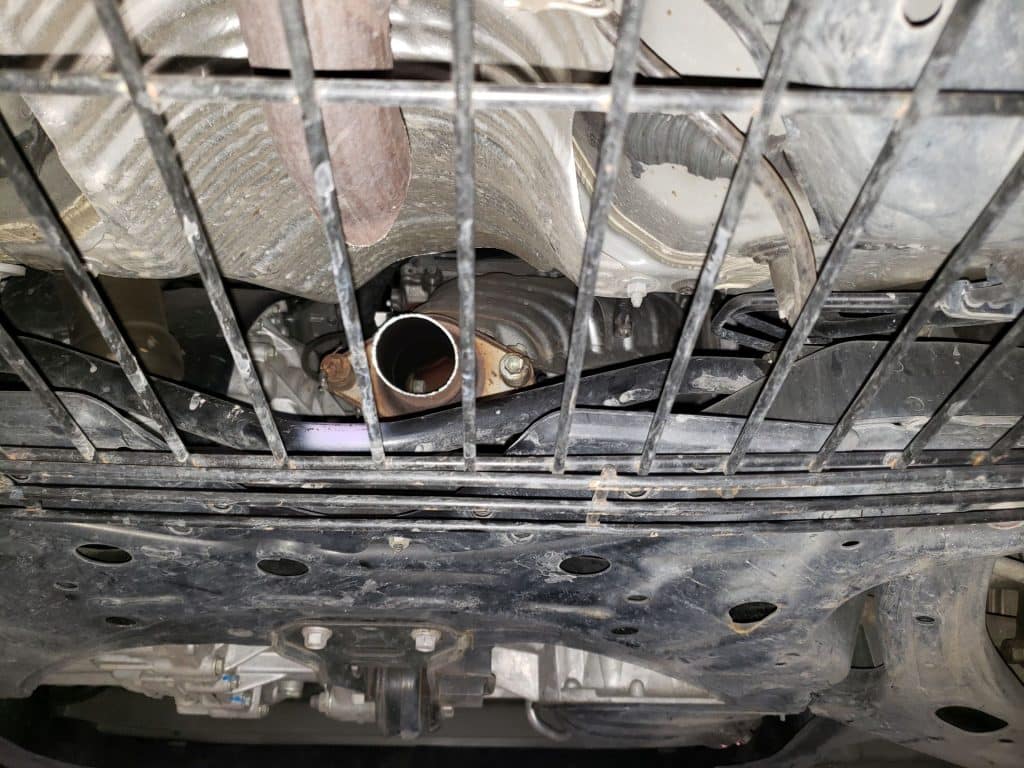
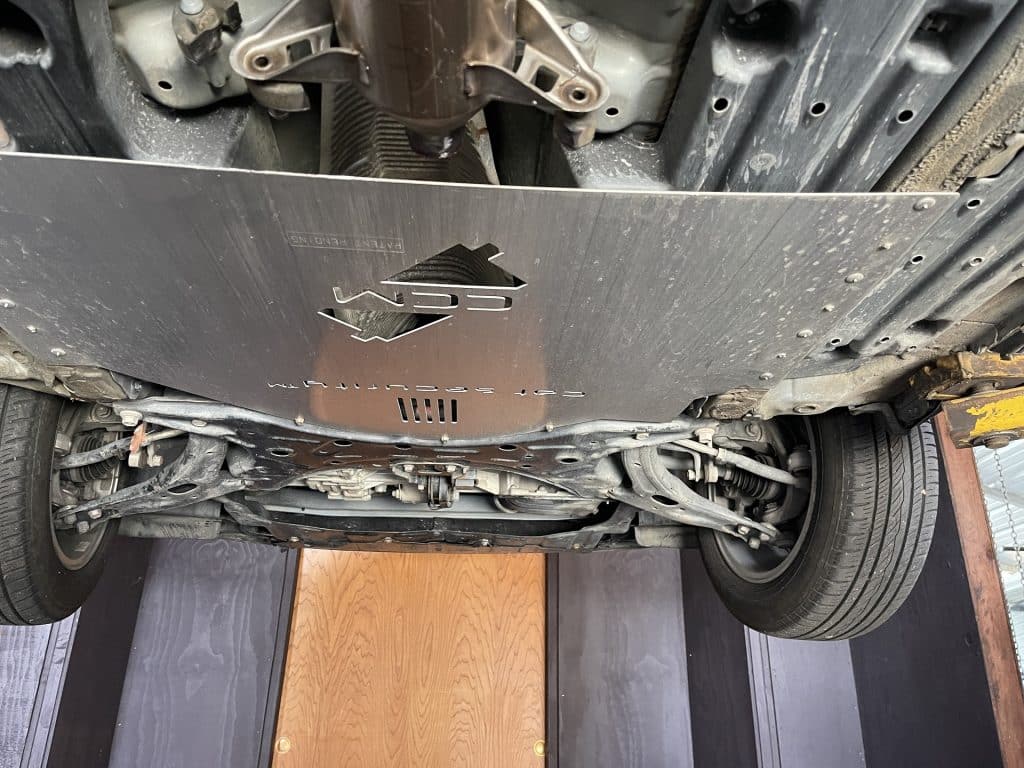
Best catalytic converter anti-theft device
For quite a while we were undefeated. Thieves would try but fail.
They’d still make a mess of our customer’s cars while they tried in vain to steal the converter, but most of the time we could weld the converter back together and save our customer $2500.
You may notice that the converter in the top picture on right was attacked with an oxy-acetylene torch, which will cut through anything, including our anti-theft cables. However, it would be pretty hard to the torch past the first converter.
You may also notice that the converter in the upper picture is nearly new. The parts label hasn’t even been burned off yet. Prius catalytic converter theft is a huge problem, and the Bay Area is a target-rich environment.
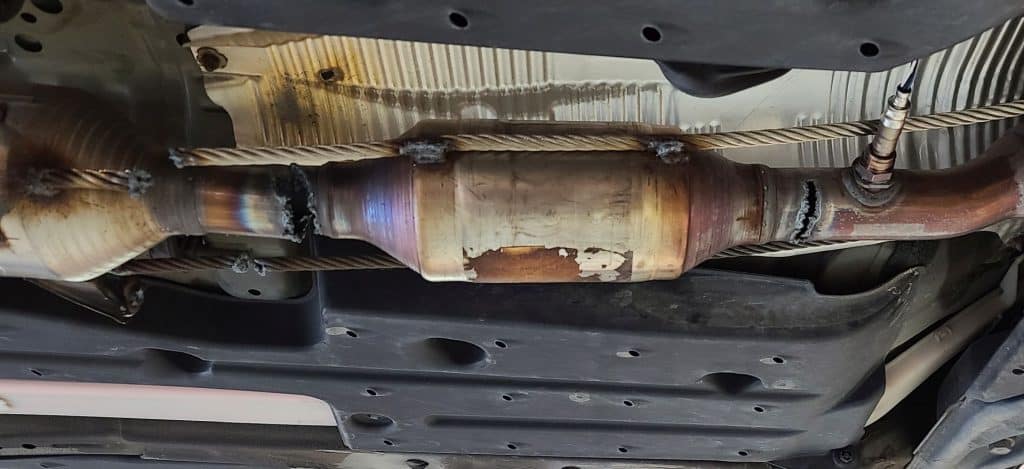
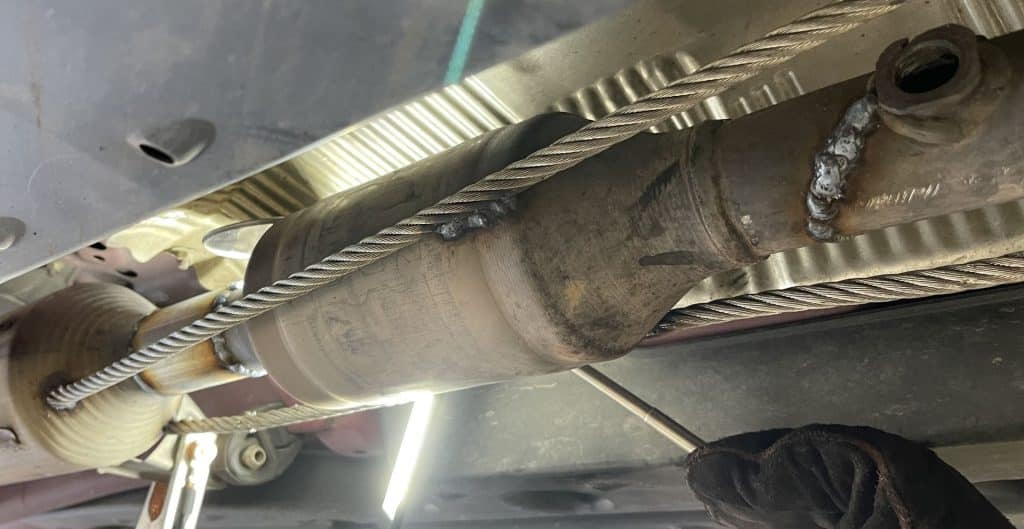
Score one for the catalytic converter theft rings 🙁
Any converter protection system can be defeated. Our converter anti-theft system enjoyed a lot of success, primarily because the thief’s tool of choice is a battery powered Sawzall. Cables move around while trying to cut and are so hard they quickly ruin the saw blade.
Eventually so many Priuses were equipped with some sort of anti-theft system. If you wanted to steal a converter, you’d need to be able to defeat the converter lock.
Converter poachers added battery powered cut off wheels to their tool kit. Our theft prevention system now only slowed the thieves down.
We compare the catalytic converter cables to a bicycle lock. It would be foolish to leave a bike unlocked, but it might be stolen regardless.
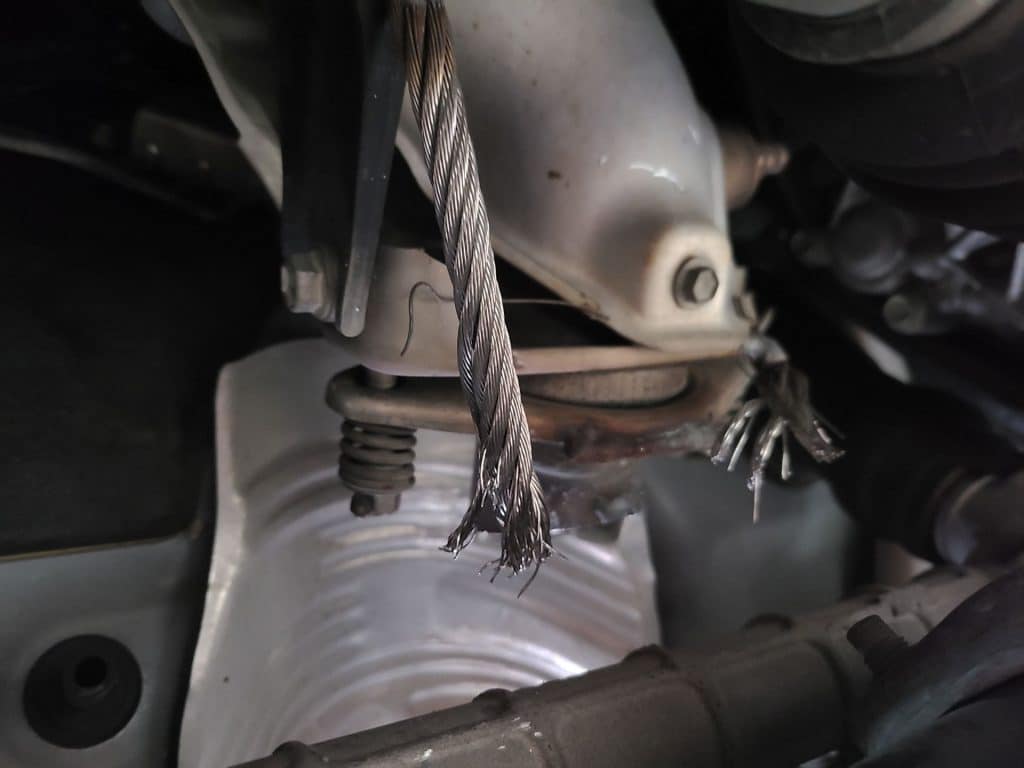
How to stop catalytic converter theft
So, how to prevent catalytic converter theft then. Catalytic converter shields don’t work. Catalytic converter cables doen’t work. Is there a catalytic converter theft prevention system that will work?
The short answer is no. However, if you wanted to do everything you possibly could, I’d recommend the belt and suspenders approach. Install cables, and a cat shield, and it wouldn’t hurt to add an alarm with a tilt sensor that will sound when the car is jacked up.
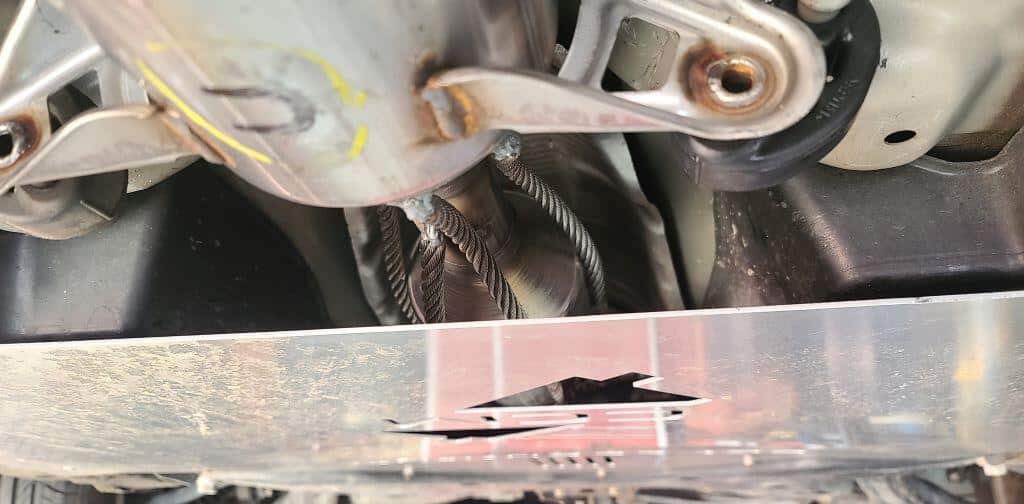
Prius catalytic converter theft model years
What started as a problem for owners of the Gen2 Prius quickly developed into an issue for other generations. The Gen3 Prius became a target for catalytic converter theft as well. The third generation runs from 2010 – 2015.
The biggest problem for victimized Prius owners was (and still is) parts availability. The Gen3 Prius converter goes on national backorder frequently. Often owners need to wait 2 months for parts.
Another issue with converter theft on the 2010-2015 Prius is the heat exchanger built into the exhaust pipe. If the pipe is cut and the coolant leaks out it can ruin the engine. One of our unfortunate customers drove his car with a missing converter, which overheated the engine.
People stealing Gen3 Prius converters became an even greater problem than the Gen2 converter theft. We started this page with a picture of $22K worth of catalytic converters. Look to the right an behold $60,000 worth of catalytic converters. These were all installed two weeks later, but the pile never disappears completely.
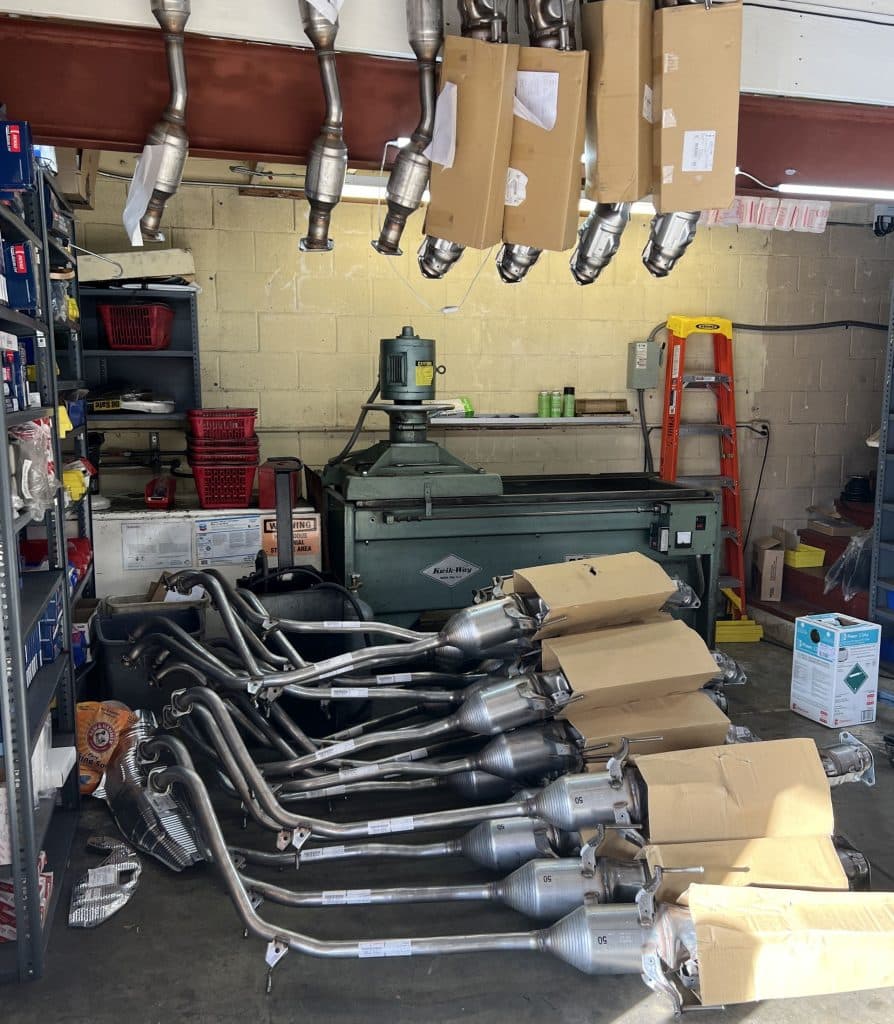
Will insurance cover a replacement catalytic converter?
Your insurance may cover a replacement catalytic converter if your converter is stolen. If you own a Toyota Prius, Honda 2003-2007 Honda Accord, Toyota Tacoma, or any year Honda Element, I’d recommend making sure you have comprehensive coverage and a low deductible. Comprehensive insurance covers things other than collisions. Fire, theft, falling trees, etc.
Also, if you own a car other than a Prius, I’d recommend paying extra for coverage that includes genuine parts.
Aftermarket catalytic converter are nowhere near as good as the original equipment. We won’t install them here because we don’t want to deal with the warranty issues.
Most insurance policies stipulate that used, reconditioned, and aftermarket parts will be used. In the case of the Toyota Prius, this isn’t a problem because there are no aftermarket catalytic converters.
However, for a Honda or other Toyota, your insurance may insist that will only pay for the cheapest aftermarket part available. If you want an original equipment catalytic converter, you’ll need to pay the difference out of pocket. How much is that? Often $1000 or more.
Having good insurance is a great, but you should also do everything you can to keep your converter from being stolen. You may need to wait two months for a part, and insurance rental coverage (if present) usually only lasts a couple weeks.
Why are catalytic converters being stolen?
A catalytic converter has a ceramic element thinly coated with a catalyst. A chemical catalyst is a substance that speeds up a chemical reaction without itself being consumed in the process. Catalytic converters use precious metals as a catalyst. Metals like platinum, palladium, and rhodium.
Platinum, rhodium and palladium prices have increased, along with converter theft, since 2018. Most people consider platinum an expensive metal, and at ~$1000/oz, it is. Palladium is a little more at $1500/oz. Rhodium on the other hand is extremely expensive, with a current price of $12,000/oz.
Who is stealing catalytic converters?
Assholes is the short answer, but there are two flavors.
First there are the people who actually steal the converter. They’re usually drug addicts and wannabe gangsters, frequently claiming to be gang members when confronted. These people are caught and released all the time. As far as Berkeley, Oakland, and San Francisco are concerned, property crime isn’t a crime, just ask the manager at a Walgreens, if you can find one that’s still open in this area.
Then there are the people who buy the converters. This is the organized part of the crime ring.
There has been only a single bust that I’m aware of. It occurred in November of 2022. Some people were arrested in Sacramento and some people were arrested in Oklahoma.
Both groups processed the converters at the same “metal refinery”. Since November, after “the” bad guys were “taken down”, converter thefts have continued at the same rate.
Obviously, as long as there’s money to be made and people are going to continue stealing converters. It has been proven to be a profitable “business”.
The chemical engineering necessary to extract the platinum, palladium, and rhodium isn’t any more complicated than making meth amphetamine, and there’s no shortage of “pros” and amateurs able to do that.
Dumbass drug addicts who lack the ability to consider consequences are also in no short supply. Not that the consequences theft of catalytic converters is all that dire anyway.
Albert Samaha wrote a very readable article about catalytic converter theft for Huffington Post that I enjoyed. Maybe you will too. My favorite bit was that when one member of the organization bought a new $550,000 McLaren.
“The car’s vanity license plate read “GD3 EA6,” the parts code for catalytic converters from Toyota Priuses manufactured between 2004 and 2009.”
Now that’s some gangster shit right there.
There are lots of other Soprano-esque quotes in there as well.
For future reference,” Andrew Vang replied, “don’t say they were stolen.”
Well, you’ve got to be safe when talking to informants, right? In his mind he was avoiding legal trouble rather than confirming that he had indeed heard the informant saying that the converter was stolen and that he planned to purchase stolen converters from him in the future.
And some awesome coded texts with all the furtive acumen of a teenager looking to buy some weed.
“I need more Prius lol.”
“Where your boy at Tou?”
“He shipped me 300 sets today.”
“Yeah just you know be careful I’m still buying but very dl very dl”
The FBI linguists will never be able to crack that code. Very “dl” indeed.
The article is worth a read. Find some humor in a depressing situation. Moronic gangsters buying houses and Lamborghinis with cash while “outsmarting” the IRS and FBI by only withdrawing $10,000 at a time.
The Government’s Ineffectual and Misguided Attempts to Stop Converter Theft
Do you remember when the US was attacked by 19 Saudi citizens, and we responded by invading Iraq? Welp, that’s what our government does and they’re not going to disappoint us this time. They’ve screwed up as usual.
Proof of ownership to sell a converter
SB-1087 Now you can’t sell a converter to a metal recycler unless you can prove it came from your own car. So be sure to take some selfies with your catalytic converter in case you ever want to sell it.
But seriously. let’s remember that in the only bust of converter theft ring, the converters were being processed by the ring, not being sold to a metal recycler. But hey, let’s make Iraq, oh, I mean car owners and metal recyclers pay for this crime wave.
Targeting the Groups Who Aren’t Stealing Converters
AB-1740 This one requires people and businesses to document information about the purchase of converters including the VIN, year, make, and model of the car the converter came from.
Of course, the VIN contains the year, make, and model of the car, but if you’re sitting Sacramento and know absolutely nothing about cars or metal recycling or the habits of organized crime, you might not know this. It doesn’t matter, go ahead and legislate.
Once again, legitimate scrap metal recyclers haven’t been involved with any criminal activity, at least as far as we know based on the single arrest of “the” perpetrators.
VIN etching – A Silly Waste of TIme
SB-986 didn’t pass as far as I know. It had some rules about documentation and required etching of a VIN number on catalytic converter. Regardless, it places requirements on legitimate businesses and ignores the fact that stolen converter processing is done by an organized crime ring, who probably doesn’t care much about record keeping or checking the VIN number on converters.
More funding for CHP property crimes enforcement
AB-1653 This one funds the California Highway Patrol and makes property crime a priority. I don’t have any specific negative comments on this one.
The CHP is pretty obviously under-funded. Our freeways are literally the wild west.
No need for plates. Drive however you feel like. 50% of the cars in the carpool lane are single occupied.
My only issue with AB-1653 is that once property crime becomes a priority, and arrests are made, I kind of doubt the DAs are going to have the will to prosecute. Property crime doesn’t seem too high on the list right now. I guess we’ll see. The CHP needs some more funding regardless, so no whining from me.
The real problem with catalytic converter theft
The real problem with this is that there are a lot of people who are barely hanging on right now. They don’t have comprehensive insurance because that’s one of the expenses they had to cut. We’ve had a couple years of covid shut down, many good jobs have been replaced with gig work and low-paying Amazon-type jobs, and now in 2023 we’re seeing some major layoffs.
Imagine doing your best to stay afloat and then you get in your car to go to work and you’re $3000 poorer! Or maybe $3000 just ain’t gonna happen. Now you have no car. It’s screwed up.
Thieves aren’t just hurting people financially. They’re literally killing people.
60-year-old man shot dead in Oakland while confronting converter thief.
Berkeley man shot at by catalytic converter thieves.
Berkeley police investigate gunfire during catalytic converter theft.
This stuff is happening in neighborhoods where families live. Be careful. Thieves usually work in pairs or trios. Check the area carefully if you think you have the jump on them, or better yet call the police.
